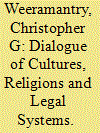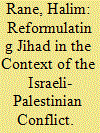|
|
|
Sort Order |
|
|
|
Items / Page
|
|
|
|
|
|
|
| Srl | Item |
| 1 |
ID:
078266


|
|
|
|
|
| Publication |
2007.
|
| Summary/Abstract |
The following is an edited version of the La Trobe University Centre for Dialogue inaugural annual lecture delivered by Judge Christopher G. Weeramantry to mark the launch of the Centre at the Great Hall of the National Gallery of Victoria, Melbourne, 15 August 2006.
1 1?This essay is an edited version of the La Trobe University Centre for Dialogue inaugural annual lecture to mark the launch of the centre at the Great Hall of the National Gallery of Victoria, Melbourne, 15 August 2006
|
|
|
|
|
|
|
|
|
|
|
|
|
|
|
|
| 2 |
ID:
078264


|
|
|
|
|
| Publication |
2007.
|
| Summary/Abstract |
The global political discourse of 'dialogue among civilizations' emerged in the '90s in the context of the political debate on world order and against the background of the two competing and powerful discourses of the 'clash of civilizations' and the 'end of history'. In the post 9/11 context and after five years from the designation of the UN Year of the Dialogue among Civilizations, this political discourse has been increasingly the object of a double movement of scepticism and hope. Unfortunately very little attention has been devoted by International Relations and Political theorists to clarify and articulate its possible meaning as a normative framework for the future of international relations. Within this normative horizon, this paper shows how two statesmen-intellectuals, Mohammed Khatami, the reformist Muslim cleric then president of Iran, and Václav Havel, the 'post-modern' dissident playwright then president of the Czech Republic, have been two of the most interesting proponents of this global political discourse. Their visions, I would contend, allow us to trace more clearly the contours of dialogue among civilisations as a global political discourse as well as to begin a more in-depth theoretical articulation of dialogue of civilisation as international political theory, an academic enterprise that has been largely ignored
|
|
|
|
|
|
|
|
|
|
|
|
|
|
|
|
| 3 |
ID:
078262


|
|
|
|
|
| Publication |
2007.
|
| Summary/Abstract |
The US administration recently asserted that it was supporting liberal values through the deployment of military force to 'liberate' Iraq. This paper explores one aspect of the topical theme of liberalism and the use of force through a philosophical exercise concerning the means used to attain such ends. Drawing on the liberal political tradition, this paper puts forward an ideal type, a benchmark as it were, for militaries and their deployment by governments avowedly in pursuit of liberal agendas. This ideal type is constructed in two sections: operationalization and form. This paper therefore begins to provide a mechanism, some guidelines or talking points, for articulating and evaluating just how well liberal states may or may not be living up to their proclaimed lofty ideals in the very real world of military force and military forces at a time when a fundamental 'transformation' of defence is claimed to be a pressing priority
|
|
|
|
|
|
|
|
|
|
|
|
|
|
|
|
| 4 |
ID:
078265


|
|
|
|
|
| Publication |
2007.
|
| Summary/Abstract |
The Israeli-Palestinian conflict remains unresolved largely due to a failure to redress its asymmetry and the fact that the 'peace process' is not based on international law, specifically the resolutions of the United Nations. The mounting religious dimension is also perpetuating the conflict's intractability. The classical Islamic siyar1 with the doctrine of jihad at its core represents an authoritative 'Islamic' response to conflict and relations with non-Muslims. However, the militant response of some Palestinians to the Israeli occupation has been detrimental to their struggle for a restoration of rights, including self-determination. This article presents a theoretical framework for a reformulation of the classical doctrine of jihad. This reformulation must possess Islamic legitimacy, consistency with modern international norms, and the capacity to contribute to a just resolution of the conflict. The reformulation process needs to overcome the method of naskh (abrogation)2 and replace it with an approach to interpretation based on 'contextualization' so as to make accessible the broadest possible range of strategies in response to conflict contained in the Quran and the Prophetic traditions.3 Such a reformulation of jihad is necessary, though not sufficient, to generate the requisite international support for the norms of racial equality, dignity, and self-determination to redirect the strategic and material interests of influential states, shifting their foreign policies toward a just resolution of the conflict based on the resolutions of the United Nations
|
|
|
|
|
|
|
|
|
|
|
|
|
|
|
|
| 5 |
ID:
078263


|
|
|
|
|
| Publication |
2007.
|
| Summary/Abstract |
In September 2002 Iraq became a grave danger. As such, there was an urgent need to topple Saddam Hussein's regime, according to the Bush administration. On closer examination, however, there was little underpinning this sudden shift in the Bush administration's security claims. How then could an eventual war come about from a lack of objective threats? The Copenhagen School's notion of 'securitization' seems ideally suited to help explain this situation, since it posits that security is about the perception of threat which flows from claims that something poses a grave danger, rather than the discovery of so-called objective threats. The purpose of this article therefore is to test the explanatory value of this conceptual framework. The approach taken is to view the lead up to the 2003 US-led invasion of Iraq through securitization's lens by juxtaposing the Bush administration's public pronouncements and private statements with broader evidence related to its security claims at the time. An additional, and necessary, part of the analysis is to explore the political uses of claiming that something is a 'security' issue. While suggesting how a heightened appreciation of audience socialization can help explain why identical security claims resonate with some groups but not others, the investigation reveals that securitization is indeed a useful tool to understand what occurred.
|
|
|
|
|
|
|
|
|
|
|
|
|
|
|
|
|
|
|
|
|